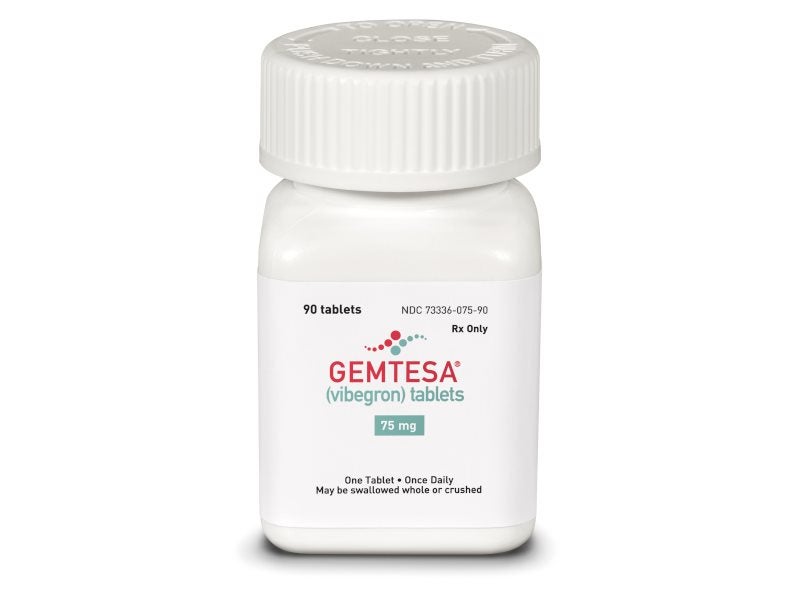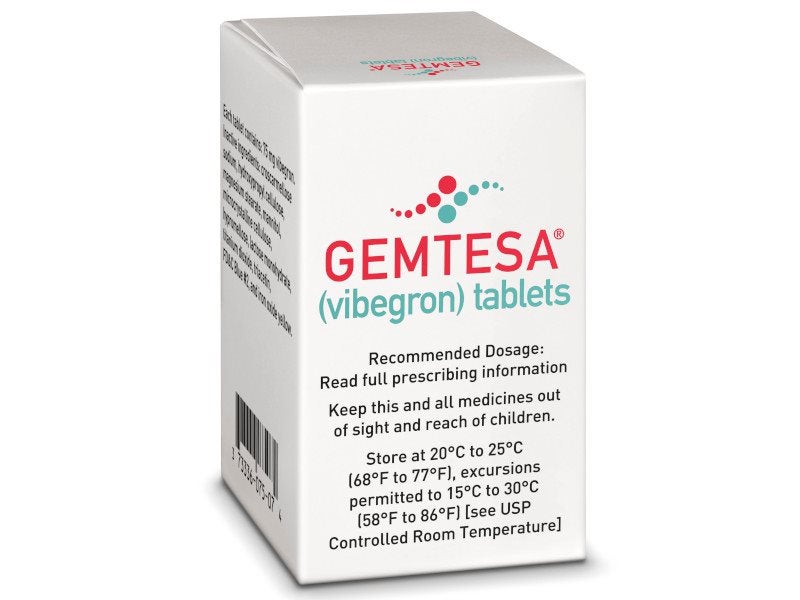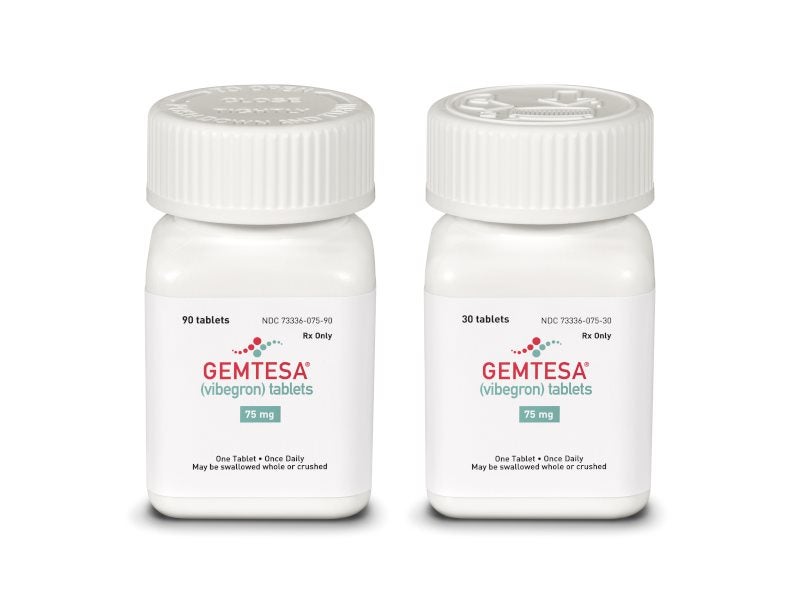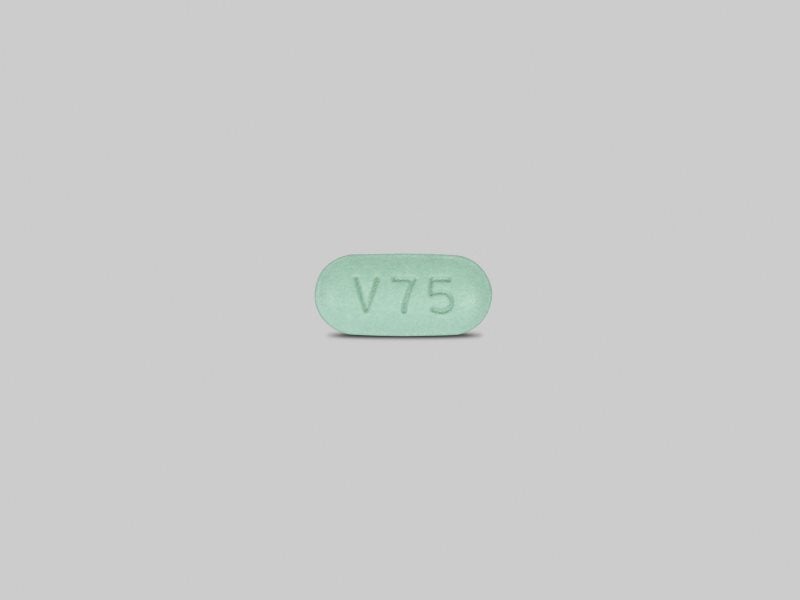GEMTESA (vibegron) is an oral medication indicated for the treatment of overactive bladder (OAB) with signs of urge urinary incontinence (UUI), urgency, and urinary frequency in adults.
GEMTESA is available as an oral once-daily, oval, light green, film-coated tablet in 75mg strength.
The drug was originally developed by Merck, a pharmaceutical company based in the US. Japanese company KYORIN Pharmaceutical, then licensed the drug from Merck in July 2014 for development in Japan and other Asian territories.
KYORIN signed an agreement with Kissei Pharmaceutical for the co-development and co-marketing of the drug in March 2016.
Urovant Sciences, a subsidiary of Sumitovant Biopharma, licensed the drug from Merck in February 2017 for global developments, excluding Japan, China, and other Asian countries.
In March 2021, KYORIN and Eisai, a pharmaceutical company based in Japan, entered into a license agreement for the development and distribution of vibegron in Thailand, the Philippines, Malaysia, and Brunei. Eisai will be responsible for the development and marketing of vibegron in these countries.
Urovant and France-based pharmaceutical company Pierre Fabre signed an agreement in July 2022 to commercialise vibegron in the European Economic Area, the UK, Switzerland, Turkey, and certain Eastern European countries.
In March 2023, KYORIN and Sumitomo Pharma signed a licensing agreement for the development, production, and commercialisation of vibegron in Taiwan, Hong Kong, Singapore, Indonesia, and Vietnam. Sumitomo will develop, manufacture, and commercialise vibegron in these five countries and areas.
GEMTESA approvals
KYORIN received approval for vibegron for the treatment of adults with OAB from Japan’s Ministry of Health, Labour and Welfare in September 2018. Vibegron was launched under the brand name Beova in November 2018.
A new drug application for vibegron was submitted to the US Food and Drug Administration (FDA) in December 2019, which was accepted for review in March 2020.
The FDA approved vibegron for the treatment of adults with OAB in December 2020. Vibegron was commercially launched under the brand name GEMTESA in the US in April 2021.
OAB causes and symptoms
OAB is a clinical condition that happens when the muscles of the bladder contract involuntarily. When the bladder muscle contracts too frequently or at the wrong time, the affected person might have signs of an OAB.
The condition is marked by a sudden need to urinate that is difficult to manage with or without accidental urinary discharge and typically with elevated urinary frequency. Unintentional urinary leakage due to urgency is referred to as UUI. Excessive urination (usually eight or more times in 24 hours) and nocturnal symptoms are some of the other symptoms of OAB.
More than 30 million people in the US suffer from the troubling symptoms of OAB, which can significantly hamper the day-to-day activities of patients.
Vibegron’s mechanism of action
Vibegron is a small molecule, selective human beta-3 adrenergic agonist that binds to and activates the beta-3 adrenergic receptor on the bladder.
Activation of the beta-3 adrenergic receptor increases the capacity of the bladder by calming the detrusor smooth muscle during the bladder filling.
The drug’s safety and efficacy in children remain unestablished.
Clinical trials on GEMTESA
The FDA’s approval of GEMTESA was based on a 12-week, double-blind, randomised, placebo-controlled, and active-controlled clinical trial named EMPOWUR.
A total of 1,515 patients with OAB were randomised in a 5:5:4 ratio to receive either GEMTESA 75mg (n=545), placebo (n=540) or active control (tolterodine; n=430) orally once daily for 12 weeks.
The patients with signs of OAB for at least three months with an average of eight or more micturitions a day and at least one UUI a day, or an average of eight or more micturitions a day and at least three urgency episodes a day were eligible to enter the trial.
The study’s population included OAB opioid-naive patients, as well as patients who had undergone previous OAB drug therapy.
The co-primary endpoints of the trial were changes in micturition frequency and UUI episodes at week 12.
At 12 weeks, micturition reduced by an adjusted mean of 1.8 episodes a day in patients receiving GEMTESA compared to 1.3 episodes a day for placebo and 1.6 episodes a day for tolterodine.
In incontinent patients, urge incontinence episodes decreased by an adjusted mean of two episodes a day for GEMTESA versus 1.4 for placebo and 1.8 for tolterodine.
GEMTESA was also substantially superior to placebo for secondary endpoints including the number of urgency episodes, volume per urination, and proportion of incontinent patients with a 75% or higher reduction in the urge incontinence episode.
The most common adverse reactions of GEMTESA in patients during the trial were diarrhoea, nausea, headache, upper respiratory tract infection, and nasopharyngitis.
EMPOWUR extension study
GEMTESA’s long-term safety, tolerability, and efficacy in adults with OAB was evaluated in a 40-week Phase III EMPOWUR extension study.
The study enrolled 500 patients who completed the EMPOWUR study and were administered with either vibegron or tolterodine. Urovant announced the results of the study in May 2022.
After 52 weeks of treatment, 61% of patients with wet OAB receiving vibegron experienced a 75% reduction in UUI episodes compared to 54.4% of patients treated with tolterodine, and 40.8% of patients treated with vibegron experienced a 100% reduction compared to 34.2% of patients treated with tolterodine.






